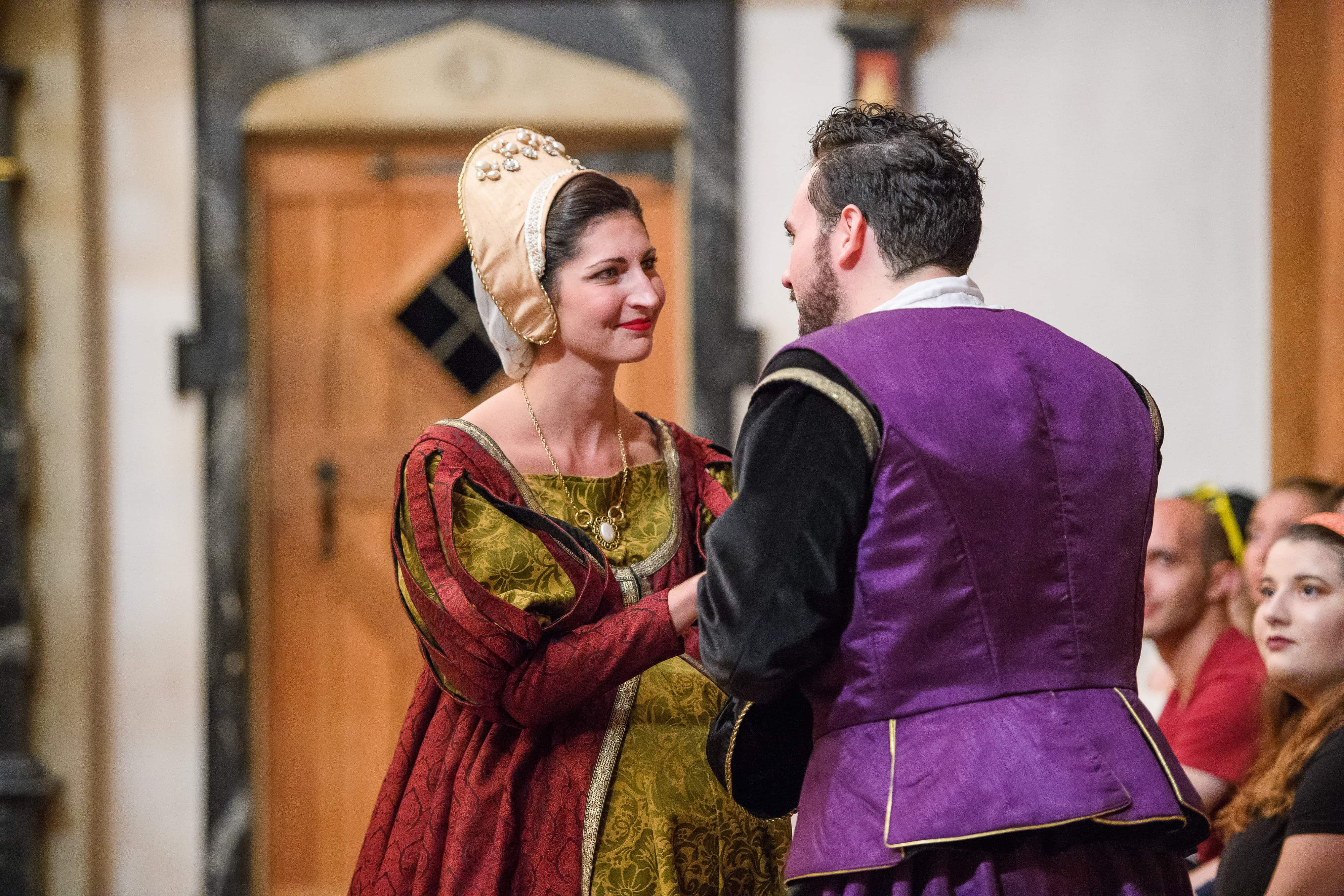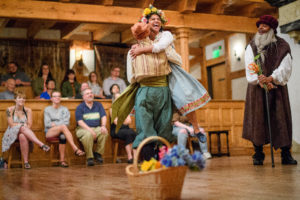For all his brilliance, Shakespeare still suffers from the occasional whining of critics about his later “problem” plays. Longer and more complex, with familiar plot lines splintered and grafted into seemingly bizarre new patterns, these plays have suffered from their reputations as head-scratchers.

The Winter’s Tale is a classic example; a tale of jealousy, repentance and forgiveness which spans no fewer than 16 years (!!), the play is remembered today in part for its dubious geography (Bohemia has a seaside here) but primarily for a terse blocking note: “Exit pursued by bear.”
That there might be more to The Winter’s Tale than a ‘Bohemian Navy’ or some dudes in a bear suit plumb evades us. That all this confusion might be incredibly entertaining and moving, ditto.
Leave it to the American Shakespeare Center to show how this masterpiece shines when it’s performed in the context for which it was originally intended. With the lights up, actors directly engaging the audience, and a brisk pace that keeps pathos and chaos well balanced. Kevin Rich has done a fine job with the American Shakespeare Center’s current touring company production. The Winter’s Tale is an intense evening of entertainment, an actor’s showcase, brimming with menace and humor, and with much to teach us about the mysteries of the heart.
To give you some idea of what ensues, here’s a brutally short plot summary: King Leontes of Sicily, in a sudden fit of jealousy, accuses his very pregnant wife of having an affair with his best friend Polixenes, King of Bohemia (or should I say, Bohemia by the Sea). Hermione delivers a daughter who is instantly whisked away, on orders of Leontes, to certain death; the queen then apparently dies of despair. Leontes’ son also dies, leaving the king a complete wreck. Meanwhile on the (ahem) shores of Bohemia the infant daughter, left out on a hillside, is discovered by shepherds and raised as a peasant girl. Sixteen years pass, and Polixenes’ son, prince Florizel, falls in love with the girl, completely unaware of her true identity. Some trouble ensues with his dad over the romance, but of course by the end of the play Leontes has repented, is reunited with the daughter he sought to kill, and is even reunited with Hermione.
(Hope you’re taking notes, there will be a quiz after the show…)
It helps immensely that the company is loaded with serious talent, beginning with Ronald Román Meléndez as Leontes. Meléndez commands the stage from the opening, and his jealous rage is as dangerous as any one might find in Shakespeare’s canon; his repentant alter ego, too, is strikingly mild and down-to-earth. Ally Farzetta’s Hermione makes a fine counterpoint; Farzetta’s quiet poise counters Meléndez’s madness nicely.

Meanwhile, as the long-lost daughter Perdita, Constance Swain lights up the stage with her every step; Swain, one of the most charismatic and talented actresses I’ve ever seen, doubles briefly in the play’s opening as Leontes’ young son Mamillius; her ability to shed or add on years at will is a joy to watch.
The supporting cast here is strong, led by Madeline Calais as Autolycus, the Bohemian trickster and (ahem) second-hand bling salesman who accidentally engineers the successful resolution of the plot. Hilary Alexa Caldwell plays the Shepherd who discovers and adopts Perdita, and her antics—accompanied by her son, played with gusto by Topher Embry—are great fun to follow. On the sober side of the scale is Andrew Tung’s turn as Camillo, Leontes’ trusted advisor who must make a fateful choice when confronted by the king’s madness.
Annabelle Rollison has two pivotal roles to play, and does both of them superbly. First, as Queen Hermione’s attendant Paulina, she delivers in Hermione’s defense one of the most heart-rending speeches that Shakespeare ever wrote, and does so memorably. She also switches gears nicely to serve as Time, the quizzical chorus-like character who tells the audience that 16 years have passed, and that’s that.
Jessica Van Essen’s costumes are as lavish as this fantastical tale calls for, with plenty of royal purple for the House of Sicily, and a healthy amount of gold for the House of Bohemia (right down to a flashy turban for Kenn Hopkins’ Polixenes). She clearly has fun with the tongue-in-cheek quality of the script, and uses her work to remind the audience of the fantastical nature of the story line.
(A special note: Ms. Swain will also be playing the title role in Antigone, as a part of the company’s three-play repertory. By rights, her turn as Oedipus’ ill-fated daughter should be an even in itself—and the company will be performing both The Winter’s Tale and Antigone at McLean, Virginia’s Alden Theatre at the end of March. I suggest ordering tickets before you finish reading this review).
If you want to see Shakespeare done right, and appreciate the true nature of the man’s genius for live theatre, ASC’s touring production of The Winter’s Tale is essential viewing.
Running Time: Two hours and 30 minutes, with one intermission.
NOTE: A Winter’s Tale is currently a part of ASC’s “Hand of Time Tour”, in repertory with The Comedy of Errors (see my review) and Sophocles’ Antigone.
The Winter’s Tale plays through March 31 at the American Shakespeare Center performing at Alden Theatre at the McLean Community Center – 1234 Ingleside Avenue in McLean, VA. For tickets, call the box office at 1-866-811-4111 or go online.
For more information about the ASC’s “Hand of Time Tour” for Spring 2019, please visit their website.




